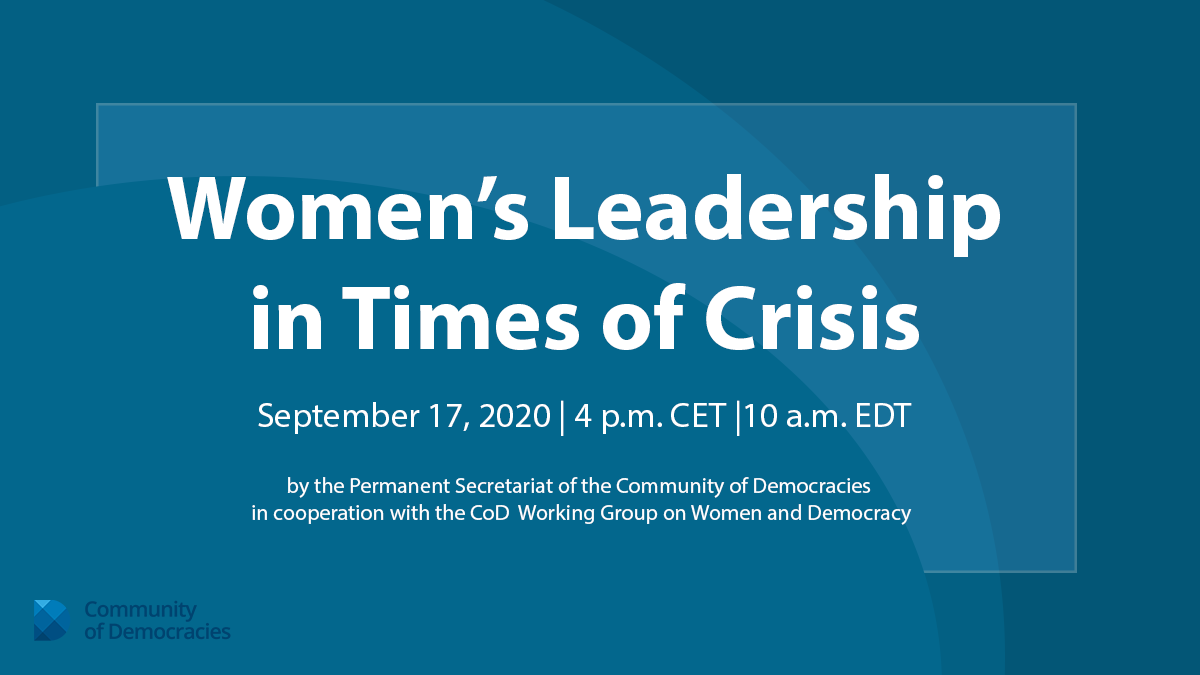

Women’s Leadership in Times of Crisis
September 17, 2020
Event Summary
This digital event was organized by the Permanent Secretariat of the Community of Democracies in cooperation with the Community of Democracies Working Group on Women and Democracy. Secretary General Thomas E. Garrett hosted the webinar.
The event discussed the importance of women’s political participation and involvement in decision-making during the COVID-19 pandemic and its recovery efforts.
Key highlights:
Rumbidzai Kandawasvika-Nhundu, Head of Political Participation and Representation Programme Global Programme, International IDEA, provided an overview on the impact of COVID-19 impact on democracy and gender equality: “The COVID-19 pandemic is exposing and deepening pre-existing and persistent gender inequalities.”
Laima Jurevičienė, Ambassador-at-Large, UN, International Organizations and Human Rights Department, Ministry of Foreign Affairs of Lithuania, highlighted Lithuania’s commitment to the topics of inclusion, women’s participation in public life and gender equality and provided examples of Lithuania’s initiatives supporting democracy movements in places such as Belarus.
Following the remarks, the panel served as an opportunity for women leaders to discuss their strategies, concerns and experiences of leading in the pandemic, highlighting the critical roles of women at the front lines of the crisis:
Katri Viinikka, Ambassador for Gender Equality, Finland, spoke about the efforts of Finland’s women-led government in responding to the pandemic: “In Finland, the government’s communication style played an important role during the COVID-19 crisis. Women leaders were found to have clear and empathetic communication skills.
Ambassador Viinikka recognized that women are working tirelessly at the frontlines of the COVID-19 pandemic, leading its response and recovery efforts, especially in the health care system and as primary caretakers.
Kelley Eckels Currie, Ambassador-at-Large of the United States for Global Women’s Issues stressed that women’s expertise and knowledge has to be included in the decision-making processes at all levels, also to drive the recovery from the COVID-19 pandemic. Ambassador Currie introduced U.S. initiatives empowering women across the globe, such as the Women’s Global Development and Prosperity Initiative, and also emphasized the need to mainstream gender equality and women, peace, and security agenda across the work of government agencies. In recent years, the United States adopted the Women, Peace, and Security Act (2017) and the first National Strategy on Women, Peace, and Security (2019).
Leslie Scanlon, Ambassador of Canada to Poland, underlined Canada’s commitment to ensure gender equality in all areas of public life, including peace and security efforts. Ambassador Scanlon outlined frameworks through which Canada implements these commitments, such as Canada’s Feminist International Assistance Policy.
Ambassador Scanlon also noted that women’s full participation in peace and security contributes to the sustainability of peace. She said, “Despite the existing evidence, women are often excluded from peace negotiations.” To illustrate women’s role in achieving and promoting peace, the Ambassador brought attention to the presence and efforts of women of Belarus as being central to the country’s peaceful protests: “We see in Belarus that women’s leadership is crucial for non-violent campaigns.”
Mira Sun, Ambassador of the Republic of Korea to Poland, highlighted that the pandemic deepened social, economic and political inequalities with women being disproportionally affected by this crisis. Ambassador Sun outlined the three important elements of the Republic of Korea’s response to the COVID-19 pandemic: openness, transparency and public engagement and noted, “Women must be equal participants in the management of the COVID-19 crisis; they shouldn’t be left on the side-lines.”
The Ambassador encouraged countries to work together and share best practices to respond to the pandemic collectively and turn this crisis into an opportunity for gender equality and women’s empowerment.
CoD YouthLeads Tinatin Oboladze of Georgia, Rita Saias of Portugal, and Lu Argueta of El Salvador participated in the event’s Q&A session and asked questions about the importance and effectiveness of gender quotas at national and local levels, leadership style of women and stereotypes behind the low numbers of women’s participation.



